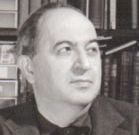| The Saturday Review AUGUST 17, 1957 The Spell of a "Natural"
Hot Afternoons Have Been in Montana: Poems by Eli Siegel In a "letter" prefacing the book, William Carlos Williams, placing him "in the very first rank of our living artists," apologizes on his own for the general neglect, and then characteristically adds: "Either a man has quit or gone forward. And if he's gone forward he's headed straight into disrepute." I'll confess that I was a little put off by the superlatives in this introduction. I'd read others in which Dr. Williams's humanity, generosity, and partiality for what they call in baseball the "nothing ball" sometimes got the better of his judgment; so I approached the poems in a hypercritical mood. I began by jotting down random reactions on a back flyleaf, as follows: "Eccentric, innocent, diffuse, compulsive, pure, original, crank." This was getting me nowhere, so I expanded a little: "One moment as wise as Socrates and the next as crazy as Benjy ..." "It's not that what he writes of isn't one of the important facts of existence, but that he seems to believe it the only one ..." "Curiously impersonal; all we know is he likes cats . . ." "Often banal but never second-hand or phony . . ." "Essential quality: elegiac, generalized compassion . . ." I was being won over in spite of myself. I wouldn't take back any of these observations, but I would have to say (as I couldn't honestly of the reading of any new poems in the past decade except those of Stanley Kunitz and Richard Eberhart) that I was under the spell of a "natural," a man who obviously wrote poetry not to prove anything but because he had to, and in the doing of it adapted no "stance," employed no "tricks." This, just as obviously, accounted for the fact that the poet seemed to feel no bitterness for the neglect of his poems, or of himself.
Like "Leaves of Grass," Siegel's book is maddening but full of surprises. He comes up with poems like "Dear Birds, Tell This to Mothers," "She's Crazy and It Means Something," and "The World of the Unwashed Dish" which say more (and more movingly) about here and now than any contemporary poems I have read. |


